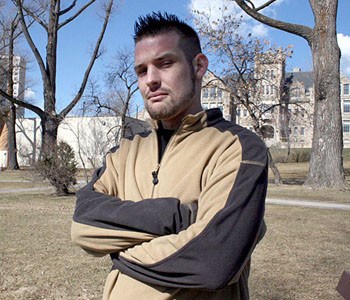Kyle Maki, 25, says he is dependent on methadone.
Maki said methadone is not a street drug and he has a right to take it as a prescription medication. However, when Thunder Bay Police Service officers placed him in custody, he said he didn’t know when the next time he would receive the next dose of the highly addictive narcotic.
"It is really up in the air if you are going to get it," Maki said. "It is something they can play with. At most, I was in (the Balmoral holding cell) for two days without getting (a methadone dose) and by the time I got to the jail, it takes another day to get it."
Ontario Addiction Treatment Centres have two methadone clinic in the city: one on Cumberland Street and the other next to Victorville Mall. Maki joined the program four years ago. He said he goes every day to receive treatment.
Police traditionally hold someone in the cell no longer than 24 hours, but withdrawal symptoms come in fast, said Maki. He added the symptoms appear similar to the flu with diarrhea and vomiting.
Maki said police did eventually take him to a methadone clinic to take his drink, made up of orange juice with the drug mixed in.
"When you are on the program, you are already at a certain level. When you get your drink you are not in anyway high; you are not sick for that day," he said. "I think they should put out a street team with a nurse or something that can administrate the doses wherever the patient may be."
According to Correctional Service Canada, a daily dose of methadone above 120 mg is considered high. Maki said his dose is reduced each month to the point where he will no longer need it.
Maki said he became addicted after an accident at work. He fell off a roof onto a brick. He began treatment with painkillers, but later moved onto methadone.
"When you get your dose it is like a security blanket," he said. "You aren’t going to be sick that day. This isn’t a street drug that gets bought and sold."
The Thunder Bay man is now working on a petition to support methadone users who don’t received regular treatment. Methadone is a powerful narcotic drug in the same class as heroin and considered an opiate. It is a legal prescription drug, unlike methamphetamine.
Chris Adams, executive officer with Thunder Bay Police Service, said complaints should be made formally so an investigation can be done, and said he couldn’t speak to any allegations on how someone was treated while in the holding cells.
"There is a process in place where they can make a formal complaint," Adams said. "In general terms, we deal with people as they come in and we make the best assessment as possible."
Adams added that police take note of anyone with a medical condition, and officers will try to take those in custody to their medical appointments. Police will contact the hospital and allow paramedics to treat the person in their cell or take them to the hospital if a medical emergency arises.
"People that are in custody with police are generally here for a short time," Adams said. "It is fairly rare that we have to make the extra effort to have our officers to provide an escort for someone to methadone treatment."
However, depending on the length of stay, the responsibility of who takes a person in custody to methadone treatment can change hands. Adams said Thunder Bay Police don’t take responsibility when a person is transferred to the Thunder Bay District Jail.
Sign in or register
- Messages
- Post a Listing
- Your Listings
- Your Profile
- Your Subscriptions
- Your Likes
- Your Business
- Support Local News
- Payment History
Registered Users
Already have an account?
New Users
Create a free account.
